Can you imagine a world without search engines? Before the invention of Archie, a simple yet effective web-based search engine, by Alan Emtage in 1990, finding anything online was less than pleasant. This was a turning point for internet users as it was closely followed by the launch of many other bigger and better search engines, including Excite, Yahoo, Infoseek, AltaVista, Ask Jeeves, and of course the now ever-popular Google. Although search engines populate highly personalized, contextual search results in a fraction of a second, there is more than what meets the eye. This, more so in the case of Google, the world leader in online search, with its mammoth 88.47% market share, not to mention its numerous other products and services. If you have forever wondered about the history of Google, including how it took over the world of internet search, this post is for you. We take you through a timeline of Google’s most landmark moments, right from its humble beginnings to its ambitious plans for the future.
The Beginning of a New Era in Internet Search
A search engine, simply put, is a software program that helps you find appropriate content online (video, textual, images, etc.). It sorts/indexes the sites of the world wide web according to various parameters like search keyword density in your site content, backlinks, etc. When you query in a keyword or phrase, it goes through its database of crawled sites and populates the addresses of those it finds most relevant. The order in which such sites are ranked is based on an internal search algorithm that decides how useful they are to you, with the top most search results on the first SERP (search engine results page) being the most relevant. The SERP may also carry paid ads as per the PPC model (pay-per-click) at the top of the afore-mentioned organic search results.
The history of Google is incomplete without mentioning its rather simple beginnings. Two Stanford University PhD students, Sergey Brin and Larry Page, met in 1995 and began working on a dissertation project that detailed the mathematical properties of the internet. In other words, the dynamic duo was interested in proving that the higher the number of quality backlinks pointing to a site, the more relevant it is to a specific search topic/keyword. This was in contrast to previous search engines that prioritized content keyword density above all else.
Nicknaming their fledgling project ‘BackRub’, Page and Brin tested their web crawler in March 1996, starting out by crawling Page’s Stanford web page. All the data collected was then analyzed and sorted by their brilliant ranking algorithm called PageRank, which ranked websites based on the number of times they were linked to by other high-authority or popular sites.
Motivated by the positive reviews BackRub got, Page and Brin launched the very first version of Google in August 1996 while working from their dorm rooms, using borrowed personal computers and buying terabytes of memory space with their own credit cards. The name ‘Google’ was a derivative of the word ‘googol’, meaning a 1 followed by a hundred zeros, alluding to the huge volumes of information they had to sift through to populate the correct search results. This word had been referenced in the book Mathematics and the Imagination by James Newman and Edward Kasner, something the duo had read and loved.
Unlock higher rankings, quality traffic, and increased conversions through tailored award-winning SEO strategies.
Elevate your web presence by Infidigit’s SEO solutions.
Unlock higher rankings, quality traffic, and increased conversions through tailored award-winning SEO strategies.
The Evolution of Google
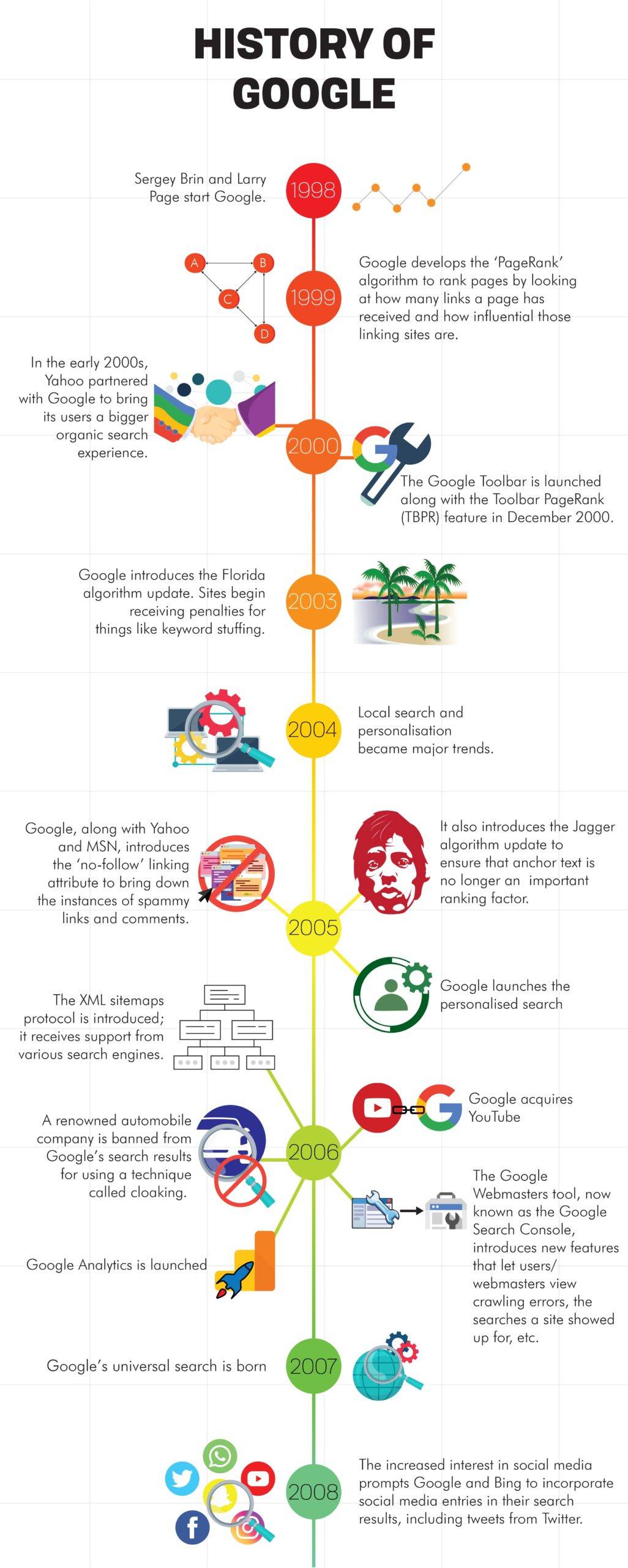
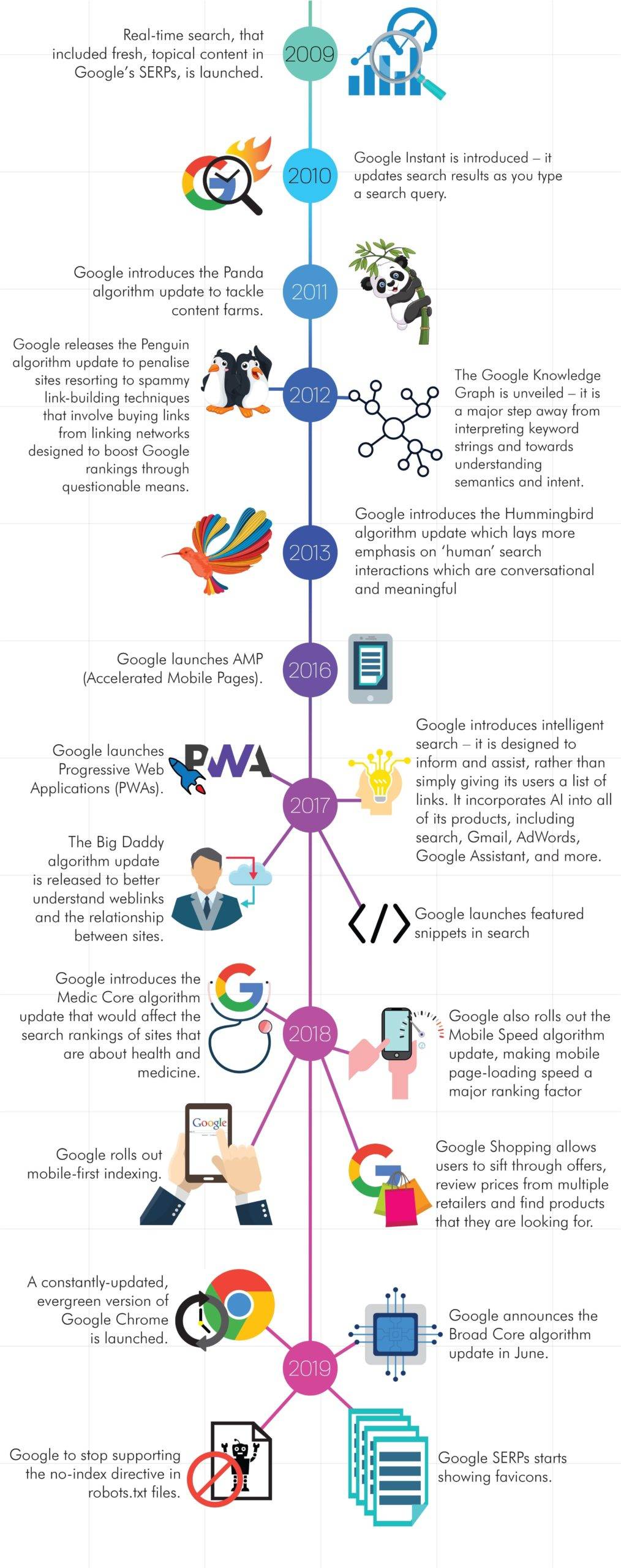
After their initial few years at Stanford University, there was no turning back for Google founders Larry Page and Sergey Brin. We trace their steps through the last two decades or so and give you a glimpse at the making of the history of Google:
The late 90s

Google started making headlines after its initial launch and was noticed by many Silicon Valley (in California, USA) investors, including the co-founder of Sun Microsystems, Andy Bechtolsheim. He wrote Brin and Page a generous check of $100,000, prompting them to set up office in their friend, Susan Wojcicki’s garage in Menlo Park California. Susan was one of their first hires and went on to become the esteemed CEO of YouTube. A minimalist blue carpet, ping pong table and multiple desktop computers marked the beginning of their tradition of keeping things upbeat and colourful.
1998 saw the indexing of more than 60 million webpages by Google although its name still carried the tag ‘beta’ (indicating test status). Amazon founder, Jeff Beezos, also took a keen interest in Google and invested in them in the following years. This fuelled their hiring spree with them getting engineers, admin staff, marketing professionals and others onboard. They also moved base to Palo Alto in 1999, as it was a more spacious setting for their now-growing staff.
It is believed that in this period, Google’s founders tried selling off their brainchild to a number of prospective buyers, including Yahoo, Excite and other Silicon Valley companies, but all talks fell through. In September, 1999, Google let go of the ‘beta’ tag from its title and marched into an even more significant phase of growth. Armed with a simple but powerful mission statement, ‘to organize the world’s information and make it universally accessible and useful’, Google was all set to change the way the world made use of the internet!
The 2000s

2001 saw Google filing for a patent for their pathbreaking PageRank software under creator Page’s name. They finally moved to Mountain View, California, in 2003 as it was home to a sprawling office complex now famously named the Googleplex. In 2004, the media giant made its first public stock offering amidst fear that its remarkable, breakneck growth would adversely affect the company culture. To put all these rumours to bed, the company came out with a new motto, ‘Do no Evil’, a reflection of its commitment to carrying out its day-to-day operations without personal bias and with complete objectivity. The founders even agreed in a report to future investors that the IPO (initial public offering) would have no impact on the company culture and quest for excellence. To further show that they meant business, they appointed a Chief Culture Officer to ensure that the employees of Google stayed the course when it came to company culture.
The 2000s also saw the launch of many landmark Google products, including Google News (2002), Google Maps (2005) and many more. However, the history of Google in the 2000s boasts of a handful of other major developments that shaped the future of the company. Although founders Page and Brin felt strongly about having no ads on Google’s SERPs initially, they came around fairly quickly and okayed the display of barebones textual ads. While Google initially showed simple organic results with blue highlights, it quickly evolved to include many add-on features, including images, video, etc.
Google AdWords was launched in 2000, much to the rapture of online marketers as this meant that they could bid for high-demand keywords relevant to their domain and pay using a PPC model. Today, the number and layout of such ads may be different (especially due to the introduction of Google’s Knowledge Graphs, wholesome structured data boxes displayed to the right of an SERP, in 2012) from when Google AdWords was first introduced. However, the fundamental requirement that the ads satisfy the criterion of search query relevance still remains. Google AdWords also changed the way digital marketers worked, having come to the realisation that a sound online marketing strategy is one that is based on a combination of SEO (search engine optimization) and PPC.
Google also introduced its first confirmed algorithm change, the Boston update in February 2003, leading to a shuffle of sites’ Google rankings. This marked the beginning of the ‘Google Dance’, a series of frequent changes in their search program to keep ahead of webmasters seeking shortcuts to make their site shine. Besides this, personalised search was launched in 2005, taking into account previous user behaviour online, location, etc. 2007 saw the incorporation of universal search, a feature that also populated image, video, news and other relevant results for a search term. Google Suggest (an autocomplete feature that suggests various versions of a search query as it is being entered) was officially launched in 2008.
The 2010s

In the 2010s, Google continued to launch many more products and make changes to its search algorithm. Google Instant (a feature that displays search results as the search query is being typed out) was rolled out in 2010. The now-decommissioned Google+ was introduced in 2011. Similarly, other ventures like Orkut, Google Friend Connect, and Google Buzz were rolled out in 2004, 2008 and 2010 respectively. They were then withdrawn in the years 2014, 2012 and 2011 respectively. Schema.org was introduced in 2011 to help sites better communicate with web crawlers through rich content tags. Although featured snippets were first introduced as ‘Quick Answers’ (that did not always carry the source link) in 2013, it was not until 2015 that the search community started referring to them as featured results (with links to the sites from where the information was taken). In 2015, Google and its many subsidiaries were regrouped under Alphabet Inc., a central holding company.
Google also made many noteworthy changes to its search algorithm in the 2010s, thereby affecting the history of SEO. Technical SEO experts were compelled to take stock of the Panda (2011), Penguin (2012), Hummingbird (2013), and other major changes. While the Panda update was meant to stop low-quality, spammy sites from ranking highly, the Penguin update penalized those that bought links from link-building networks. The Hummingbird update was another major step towards easy, conversational search that is both meaningful and contextual. The 2017 Big Daddy update helped throw light on the relationship between backlinks and sites, canonicalization of URLs, redirects, etc. In 2018, the Mobile Speed algorithm update was rolled out, confirming that mobile page speed is indeed a ranking factor.
Besides these ground-breaking search algorithm changes, Google also launched AMP (accelerated mobile pages) and PWA (progressive web applications) in 2016 and 2017 respectively. While the former was meant to enhance the performance of webpages on mobile devices, the latter brought mobile apps to customers through web browsers.
Some Popular Products in The History of Google
Throughout the brief history of Google, the company has been in the spotlight for all the right reasons. It has launched a wide variety of products that have gone on to attract millions of internet users every day. Rarely has any company expanded into as many industries as Google. On that note, here is a look at the six most popular Google products of all time:
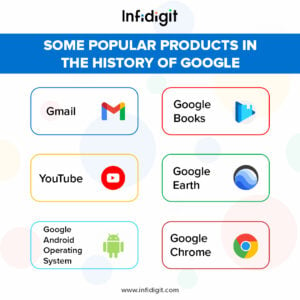
-
Gmail
The year is 2001, an important year in the history of Google, when Paul Buchheit, a Google employee, started working on an e-mail product that would address the increased storage needs and internal communications of the company. Buchheit had earlier worked in the ’90s on a web-based e-mail. For Google, he used Ajax to build a more responsive and faster client. In April 2004, Gmail was made available to the public, with a then whopping storage capacity of 1GB, along with advanced search capabilities. This was a massive improvement over what competitors like Yahoo, AOL, and Hotmail offered, which offer a few megabytes of storage back then.
-
Google Books
In 2002, Larry Page experimented with launching a digital database of magazines and books. The codename for the project – Project Ocean – was as unique as the results it was trying to achieve. Google used Optical Character Recognition to convert scanned copies of magazines and books into texts. Books were provided either by authors or publishers via the Library Project or Google Books Partner Program. Google Books was launched with the aim of democratisation of knowledge but later faced massive criticism for lack of protection against potential copyright violations.
-
YouTube
Google had to outbid companies like Yahoo, Viacom, and Microsoft for a hefty $1.65 billion to buy YouTube. It was a mutually beneficial deal for both parties. YouTube, which was only a year old, gained access to the hefty resources of Google, while Google replaced its now-defunct Google Videos platform with a more popular option. This was one of the key acquisitions in the History of Google as YouTube grew into a cornerstone of online life and modern culture and a huge revenue generator for Google’s advertising services.
-
Google Earth
In the History of Google, Google Earth made its first appearance in 2001, when Keyhole Inc., a software development company, was founded in California. Keyhole is specialised in developing applications by using geospatial data visualisation. Google took over Keyhole in 2004. In 2005, the Earth Viewer application of Keyhole was launched as Google Earth. The application provides a 3D model of Earth based on satellite imagery. It maps every structure on Earth by superimposing GIS data, aerial photography, and satellite images in a 3D globe that allows users to view landscapes and cities from various angles.
-
Google Android Operating System
Google’s first mobile operating system, Android, was more of an open-source, modified version of the Linux Kernel. Primarily designed for all touchscreen mobile devices like tablets and smartphones, it was unveiled with the launch of the first Android device – the HTC Dream/T-Mobile G1 – for commercial use in September 2008. Ever since its launch, Android has cemented its place in the history of Google as one of their most-used products, running on a wide range of consumer electronics like PCs, digital cameras, game consoles, TVs, and more.
-
Google Chrome
The history of Google Chrome browser goes back to 2008, which was when they hired numerous Mozilla Firefox developers to build Chrome for Windows XP. This was followed by the release versions suitable for Mac OS X and Linux in 2009. Although a beta software, it incorporated sandboxed tabs for more stable and faster browsing. Ten years later, Chrome has become the most dominant web browser in the world, with up to 60% worldwide usage share. It is an enormous driving force that keeps Google search popular and relevant today.
Future of Google
While Google is exploring many unique and cutting-edge ideas like projects Loon, Google Fi, Android Pay and more, online search still remains at the cynosure of its attention. Mobile-friendly pages are the way forward for website owners and SEO experts as the number of mobile users has overtaken that of desktop users. The mobile-first indexing of sites is now a norm and with people scrambling to see how well their site fares on mobile devices. Google search results are touted to be displayed in the form of individual cards for easy readability and usefulness/convenience. The Knowledge Graph may move from the right-hand side of the SERP to below the search results. Besides these, Google’s decision to stop supporting the no-index directive in robots.txt files and show favicons is awaiting the light of day.
Conclusion
Google today has offices in 50 countries and employs around 60,000 people. Its many products are used by billions across the globe and have become an integral part of our lives. It is one of the biggest success stories of our times and does not show any signs of slowing down or foregoing its top spot. From being at least five times faster than other contemporary search engines and having a much deeper site index to prioritising the relevancy/context of search results and snippets that are query-specific, Google has reinvented itself from time to time. While its future looks brighter than ever, users and webmasters around the world wait with bated breath to see what they come up with next.
If you liked this post, tell us so in the comments section. While we have so much more in store for you in the days to come, we would also love to know if you have any post suggestions for us. For the latest updates in the world of digital marketing, keep reading our blog!
Popular Searches
How useful was this post?
3.9 / 5. 9











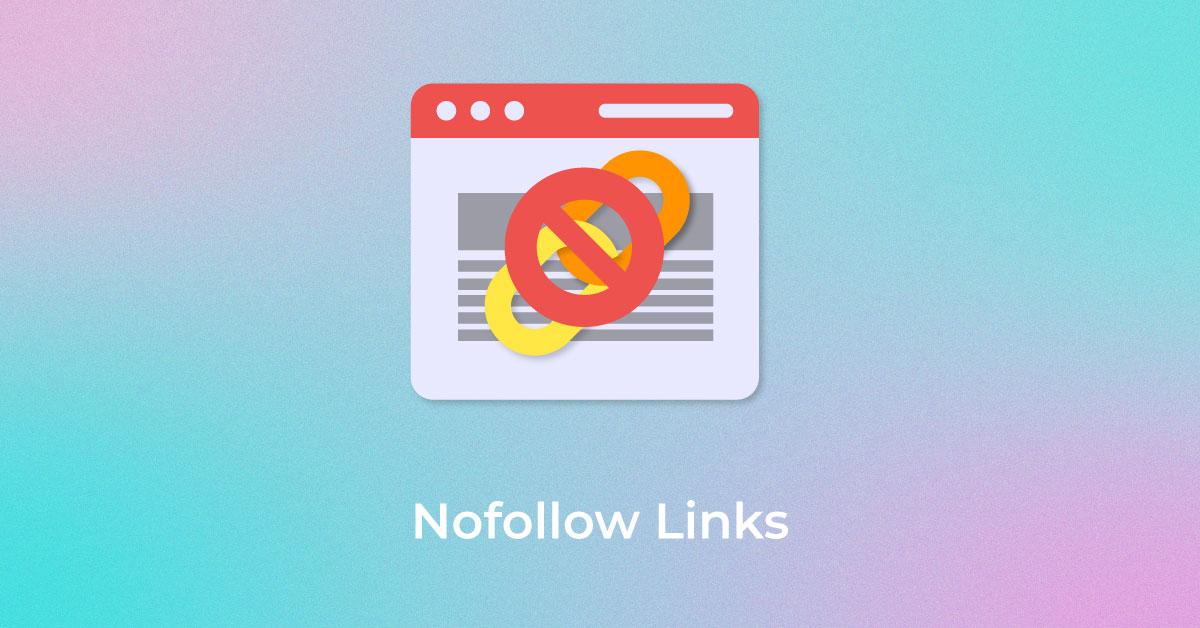
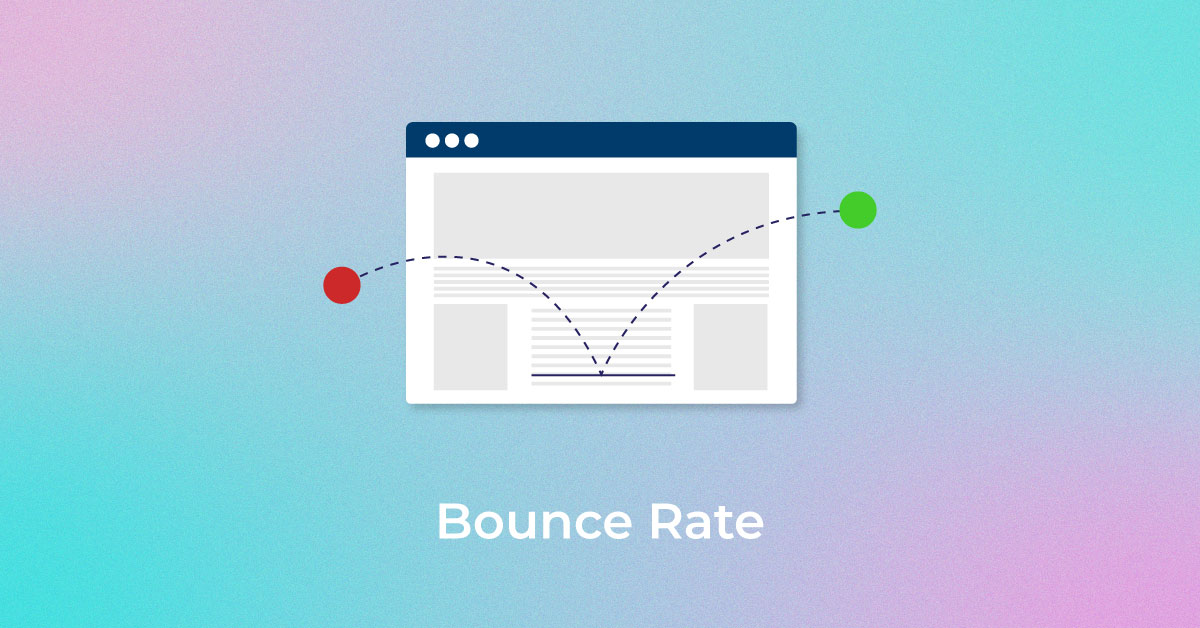

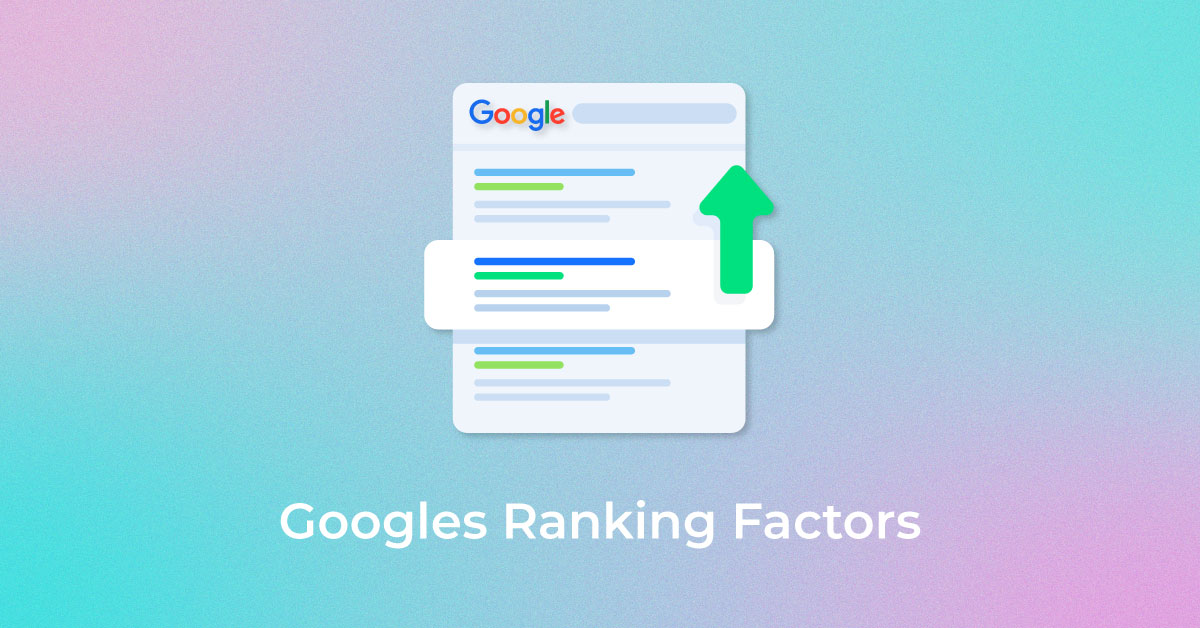



2 thoughts on “The History Of Google: How Google Was Invented And Its Evolution”
Google is SEO’s best friend, and also the biggest puzzle to solve. All the Digital Marketing agencies and business’ digital marketing campaigns revolve around being listed with Google. If Google shows you in the first page for relevant searches, you are legit and accepted.
This was an informative blog on the evolution of Google, from the simple search engine that it was before to a major business directory on the internet. Everything that we Digital marketers write, and post are optimized around this Ultimate Search Engine – Google.
We are Glad that our Blog on History of Google helped you. Subscribe to our blogs to stay updated with upcoming blogs.